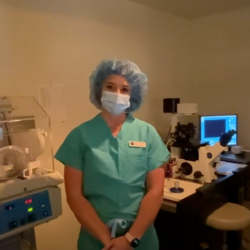
When it comes to building a family, money should not have to be a prohibiting factor. Still, many prospective parents find themselves crunching numbers to determine whether another child is financially feasible, and this concern is even greater among those who require fertility treatment, such as in vitro fertilization, to conceive. At the Fertility Institute of New Orleans, we want to give couples the opportunity to build their family as they see fit, while also keeping treatment affordable for as many people as possible.
In most instances, the cost of fertility treatment must be covered by patients, as insurance covers little to no treatment. This does not mean, however, that patients cannot plan accordingly and even save some money along the way. With a flexible spending account, patients can take care of a large portion of their expenses for treatment before even stepping foot in the office. Take a moment to learn how a flex spending account works and how it can make your fertility treatment more affordable.
Will Insurance Cover Anything?
Unfortunately, very few insurance plans include fertility treatments in their coverage, seeing as such treatments are regarded as not medically necessary. Depending on where you live in America, though, there may be a state mandate for plans to cover at least a portion of the treatment’s expenses.
In Louisiana, a mandate does not exist for plans to cover certain fertility procedures. Although some medications and diagnostic tests may be covered, patients seeking IVF or a similar procedure will still have to pay for the procedure itself. As a result, we urge our patients to begin considering their financial situation as soon as they decide on treatment, and a flex spending account is a great way to begin saving up for future expenses.
What Is a Flex Spending Account?
A flex spending account, or FSA, is a private account set up between you and your employer. Please note that an FSA is therefore only available when offered by an employer. If you so choose, you may deposit a predetermined portion of each paycheck into the account, free of tax deductions. In this way, you may effectively increase your overall salary by keeping a greater percentage of your gross earnings. There is a catch, however: the money you put into your FSA can only be used for certain goods and services, and the money must be used by the end of the year or else it will be forfeited. For most FSAs, the money must be spent on healthcare, dependent care, or elective medical services.
For employees that plan ahead and have a somewhat accurate idea of what they intend to spend on such services, an FSA can be a valuable way to simultaneously set aside money and keep a greater portion of one’s paycheck.
Using an FSA to Afford Fertility Treatment
As per 2013 federal law, FSAs are limited to $1,200 per year. This may seem like a lot to set aside for one procedure, but even with the maximum allowed sum of an FSA, patients will still have to contribute additional expenses toward IVF and other fertility treatments. This is all the more reason to plan ahead, though; by covering the initial expenses of your treatment, you will be easing the financial burden later on and, in the event you require a financing plan, future payments will be that much more manageable.
Of course, the true benefit of an FSA is its tax-saving capabilities. For employees in a lower tax bracket, a full FSA will ultimately accrue $300 to $400 in earnings that would otherwise be lost. Employees in the upper tax bracket benefit even further, retaining up to $800 in earnings. While there may be no such thing as “free money,” a well utilized FSA can certainly accrue extra money to be applied toward one’s fertility treatment.
Let Us Help You
We don’t just want to help you achieve your ideal family; we want to make the process as simple and pleasant as possible. If you have any questions or concerns about the cost of treatment, contact us to inquire about your payment options or to set up a consultation with one of our professionals.



